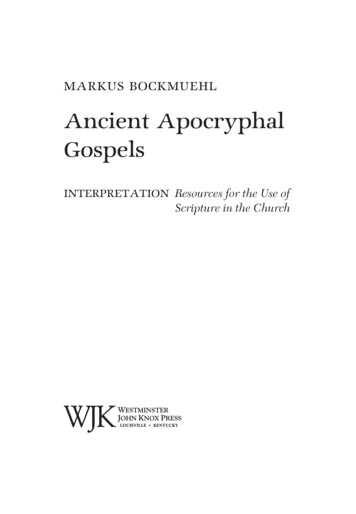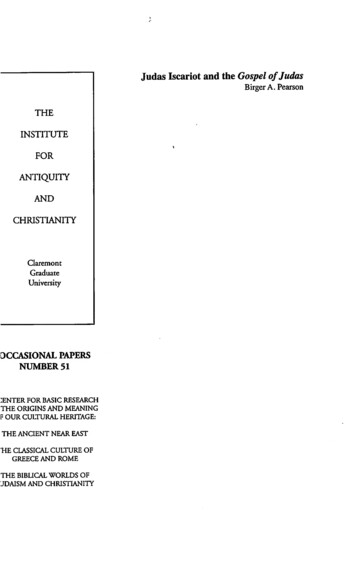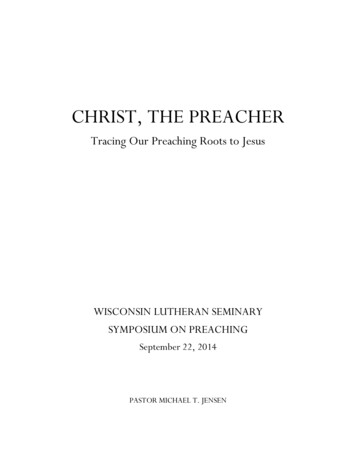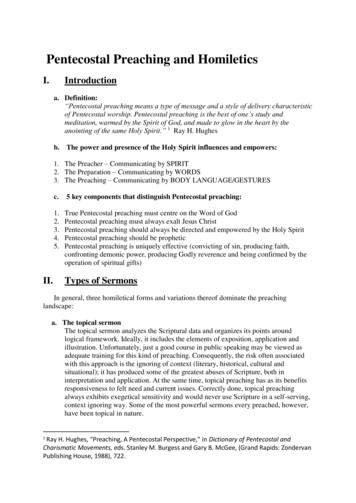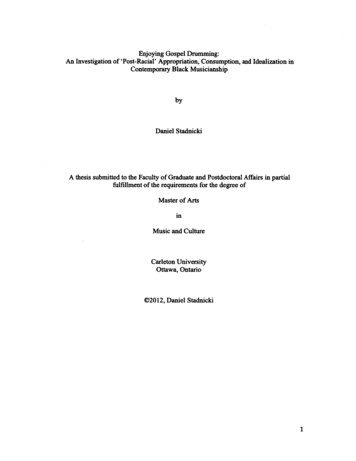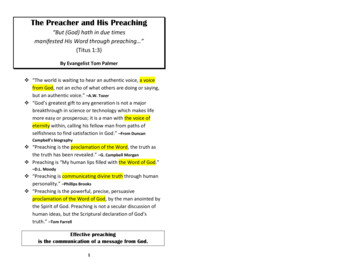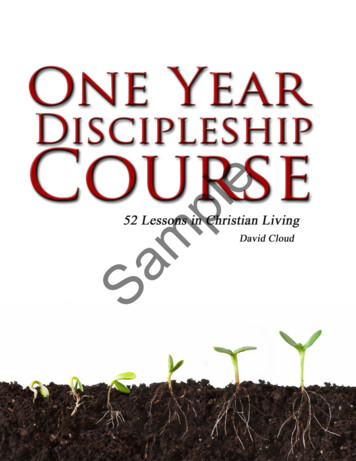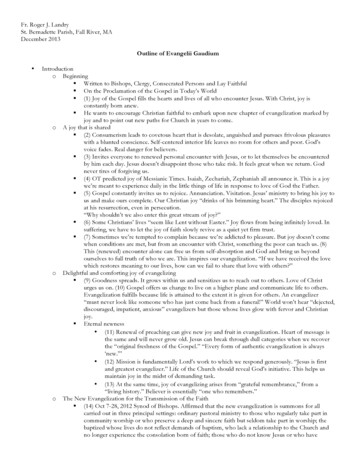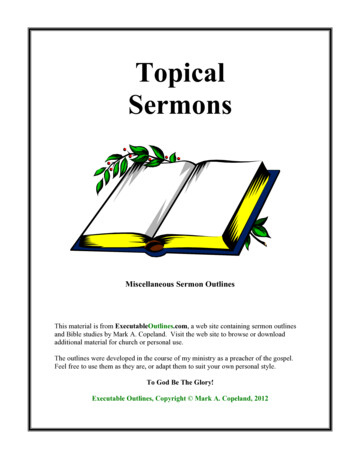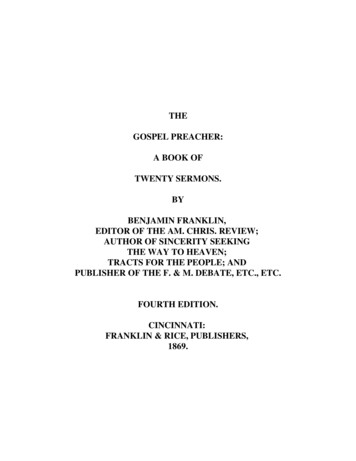
Transcription
THEGOSPEL PREACHER:A BOOK OFTWENTY SERMONS.BYBENJAMIN FRANKLIN,EDITOR OF THE AM. CHRIS. REVIEW;AUTHOR OF SINCERITY SEEKINGTHE WAY TO HEAVEN;TRACTS FOR THE PEOPLE; ANDPUBLISHER OF THE F. & M. DEBATE, ETC., ETC.FOURTH EDITION.CINCINNATI:FRANKLIN & RICE, PUBLISHERS,1869.
Entered according to Act of Congress, in the year 1868, byFRANKLIN & RICE,In the Clerk's Office of the District Court of the United States, for theSouthernDistrict of Ohio.STEREOTYPED AT THE FRANKLIN TYPE FOUNDRY, CINCINNATI.PRINTED BY THEELM STREET PRINTING CO.178 ELM ST., CINCINNATI.
CONTENTS.PAGESERMON I.EVIDENCES OF THE DIVINE AUTHORITY OF THE BIBLE.11SERMON II.WHAT MUST MEN BELIEVE TO BE SAVED?35SERMON III.HOW ARE PERSONS MADE BELIEVERS?57SERMON IV.DIFFERENT THINGS TO WHICH SALVATION IS ASCRIBED IN THENEW TESTAMENT.81SERMON V.MEN MUST DO SOMETHING TO BE SAVED.103SERMON VI.CONVERSION, OR TURNING TO GOD.129SERMON VII.THE ADAPTATION OF THE BIBLE TO MAN.153SERMON VIII.THE SIMPLICITY OF THE GOSPEL OF CHRIST.179SERMON IX.THE TWO COVENANTS.205
SERMON X.THE INAUGURATION OF THE NEW INSTITUTION.229SERMON XI.PREDESTINATION AND THE FOREKNOWLEDGE OF GOD.255SERMON XII.THE NECESSITY OF REGENERATION.281SERMON XIII.UNION OF CHRISTIANS.305SERMON XIV.NEW TESTAMENT EXAMPLE OF CONVERSION.331SERMON XV.THE COURSE TO PURSUE TO BE INFALLIBLY SAFE.355SERMON XVI.THE LOVE OF GOD TO MAN.383SERMON XVII.THE CHURCH--ITS PURITY.409SERMON XVIII.THE SECOND COMING OF CHRIST AND THE DESTRUCTION OF THEWORLD.433SERMON XIX.THE THREE STATES OF MAN--THE FLESHLY, THE INTERMEDIATEAND THE ETERNAL.457
SERMON XX.THE PUNISHMENT AFTER DEATH OF THOSE WHO DIE IN THEIRSINS.479
INTRODUCTION.THE author of the following discourses cheerfully conforms to the usualcustom, in furnishing a few words by way of introduction to his new volumeof sermons. When a new book makes its appearance, the inquiry is at oncestarted, What demand has called forth another book? or, What is the object inoffering another book to the world? It is due, both to the writer and the public,that a few words of explanation, in reply to the above and some otherquestions, should appear here.1. By means of the periodicals, and other publications, issued from thehand of the author of the following discourses, which have been extensivelycirculated in this country, and to some extent in other countries, he has becomewell known to many thousands as a writer and publisher with whom he has nopersonal acquaintance. Many of those his ardent friends he can never see andaddress in person. From these the request has frequently been made, during thepast few years, that such a series of discourses as the following should bepublished. To meet the wishes of these, in this respect, has been one reason forthe appearance of this volume.2. Again: there are many thousands, in all quarters of this country, andbeyond the limits of our own country, who have recognized the name of thewriter as a preacher of the Gospel of much success for many years past. It isnow true that he has been actively engaged in the ministry of the Word morethan thirty years, without the[5]
intermission of a single week, except in a few instances when compelled bysickness to lay by for a short time, and that more than eight thousand personshave been turned to the Lord by his own personal appeals. Many persons whohave been made acquainted with these facts, but never seen him nor heard hisvoice, desire to see a few of the discourses, as a specimen, which have beeneffective in the achievement of this work. This volume is intended, to someextent, to meet this demand.3. Numerous persons who have heard the voice of the author of thesediscourses, and participated with him in the meetings held by him in hisextended labors in half the States of the Union, desire to have a. few of thesermons they have heard, that they may read and preserve them. They wantthem because they have heard and will recognize and identify them, and thuscall up anew the thrilling surroundings and interesting scenes on the happyoccasions of their delivery, in the presence of vast audiences. They want themthat their children may read them, and recognize in them specimens of thepreaching that achieved the great reformatory movement of the nineteenthcentury, and produced such a revolution in the public mind in this great andrising country. It is an item in the intention of the writer to meet this demand.4. Many friends have made the suggestion that immense good can beachieved by placing these discourses in the hands of serious persons, that theymay consider them candidly and composedly, without the excitement of publicoccasions. We have no doubt that much good will, in this way, result fromthem. They want them to send to their friends who reside whore they have nopreaching from those devoted exclusively to the Gospel of Christ, that theymay understand the ground we, as a religious body, occupy. The volume isaimed to subserve these ends.THE CLAIMS OF THESE DISCOURSES.The author of these discourses is entirely an extemporaneous speaker,never in his life having memorized a single discourse, either of his own[6]
composition or that of any body else, and never than three times in his lifeattempting to read a discourse. He preaches frequently on the same subject, butperfectly extemporaneously, varying widely on different occasions, enlargingor abbreviating as the occasion may appear to require, and as the mind may bemore active and fruitful on some occasions than others. While many of hisnumerous hearers will recognize themes in this volume on which they haveheard him, and numerous points on which he has amplified, more or loss, intheir hearing, they will not find a single discourse which they ever heard orread word for word. Still, the themes being the same, and the argumentsbearing such a resemblance to what they have heard or read, they will readilyrecognize them. But probably a half dozen paragraphs can not befound--except in a single discourse--in the volume, corresponding word forword with any thing the author has ever spoken or written. They have all beenwritten exclusively for this volume.Such themes have been selected as to make the series of discourses similarto what the author has delivered on some occasions, especially the first tendiscourses. They are intended for men in the confused, perverted, andunbelieving condition of thousands of well-meaning people of our time, torelieve them of their doubts, perplexities, and confusion, and stay their mindson the one Lord and his holy teaching--showing them that there is somethingclear, intelligible, and tangible on which the souls of men can rest.The constant aim in preparing these discourses has been to simplify,render every thing easy and clear, thus fitting them for and adapting them tothe people. The continual effort has been to convince, enlighten, and turn thesinner to God; to build up, encourage, and comfort the saints. In doing this,numerous difficult, perplexing, and controverted points are introduced, theissues clearly stated, and the truth vindicated, maintained, and defended. Thefollowing discourses are aimed to be simply Gospel discourses, stating,unfolding, advocating, maintaining, and defending the Gospel of Christ, andopposing, exposing, and repudiating every thing in the way of it, or inopposition to[7]
it. This is done in kindness, but in plainness, and with earnestness and force.An effort been made throughout to furnish those discourses as near in the samespirit and substance as the author speaks as possible.It will be seen in the perusal of these discourses that the reformatorymovement of the nineteenth century is appreciated by the writer of these lines;that he regards the ground occupied in this great movement as invulnerable;as unquestionably right; as capable of the most irresistible advocacy,propagation, and defense; as the only hope of the present generation. It isnothing less than to return to the original ground in all things; to standprecisely where the apostles and first Christians stood; receive precisely thesame Gospel received by them; preach it as they preached it; believe it as theybelieved it, and practice it as they practiced it. As to this being not only thebest thing that can now be done, but the only thing that can be done, with anyhope of uniting Christians and converting the world, the writer hereof neverexpects to entertain a single doubt.The themes of the following discourses are discussed as if the hearer weresupposed to be listening for the first time to Gospel discourses--as if the entirematter were new to him. They are prepared in this style purposely, for thereason that the object is to give them as specimens of the author's preaching,as nearly as possible as he preaches, and many who will read them will needthe elucidations found here of the plainest matters. No attempt has been madeonly to bring the Gospel of Christ to the understanding, unfold it, defend it,and enforce it on the hearer, to the exclusion of every thing else. As Paulexplained that the grace or favor of apostleship was given to him that he"might preach among the Gentiles the unsearchable riches of Christ," and "tomake all men see what is the fellowship of the mystery, which from thebeginning of the world has been hid in God, who created all things by JesusChrist" [Eph 3:8,9]; so now, the real purpose of every man who knows themeaning of preaching the Gospel ought to be, not to blind men, but to "makeall men see," or " to enlighten all men as it respects the fellowship of themystery," which, from the[8]
beginning of time had, to the time of the apostles, been hid in God, whocreated all things by Jesus Christ, but which were then revealed to his holyapostles and prophets by the Spirit.These sermons come not with any claim of originality--any wonderfuldiscoveries of any thing new or startling; they claim simply to be soundGospel discourses, without display or flourish, in the native style of the author,addressed to the minds, hearts, and consciences of men, in reference to themost wonderful realities known to our fallen and sinful race, with the desireto make men happy. benefit and save them. They come not to engender strife,but to make peace--final and everlasting peace. To show men how to enjoy thepeace of God and be at peace with all good men, is of transcendentimportance. The writer believes there is a peace ground--a unionground--where all the good and true, the pure and holy, can unite, enjoy Godand the holy fellowship of the saints, and, with one heart and one soul, labortogether to turn the world to God. This ground, he believes, is pretty fullydeveloped in the following discourses, and the objections to it shown to bewithout foundation, and swept away. It is confidently believed by the writerthat the reader of the following discourses will find a ready relief from manyof the perplexing questions of our time--a clear path for him to pursue, and fullencouragement--if he has simply an honest desire to serve God and be saved.The teaching in these discourses, any man who reads them will readilysee, is the same in substance with the teaching of the venerable men who ledthe way in our glorious reformatory movement, with the most of whom thewriter has had a personal acquaintance, and with all of whom he has beenfamiliarly acquainted by reputation. To understand and give to others anunderstanding of the Scriptures of the Old and New Testaments containing thewill of God to man; to do that will of God, and induce others to do it, on earthas it is done in heaven, was their great aim. This great aim can not be wrong.The writer claims to unite with them in this great aim, and offers this volumeas a mite contributed in carrying out this aim.The Bible, in its own diving character, and for the purpose the Lord[9]
had in giving it, must restored to the people--not merely in in a neatly-printedvolume in in our mother-tongue, but in its own native power and grandeur. Itsdivine authority must be asserted, maintained, and defended not only as true,divine, from God, but it must be enforced, urged, and continually impressedon the hearts and consciences of men. As a people, we must make all menknow that we are simply for the Bible, in its own true import, purpose, orintent; for the God of the Bible, in the character ascribed to him in the Bible;the Messiah of the Bible, with the divine character ascribed to him in that holybook, and his offices; the Holy Spirit of the Bible, with the office and workascribed to him in the Bible; the religion of the Bible, in all its parts--its facts,its commandments, and promises; its faith, obedience, and hope; its rewardsand punishments--the whole of it; no more, no less. To it and to its DivineAuthor we have vowed eternal allegiance; to develop it, enforce it on theminds, hearts, and consciences of mankind; to advocate, propagate, maintain,defend, and perpetuate it has been the work of the author of the followingdiscourses for a third of a century; to be enrolled with its friends, a co-laborerwith them, and have their fellowship; to have their God for his God, theircause for his cause, and their final inheritance for his inheritance, is thehighest honor he desires. If this volume shall, in any goodly degree, enlightensinners encourage, comfort, and strengthen the saints, the purpose of the writerwill be fully accomplished.BENJ. FRANKLIN.[10]
SERMON, No. I.THEME.--EVIDENCES OF THE DIVINE AUTHORITY OFTHE BIBLE.TEXT.--"To whom he showed himself alive, after his sufferings, by manyinfallible proofs."--ACTS i: 4.THE Evangelist Luke, author of the book styled Acts of Apostles, madethe statement just read, and now selected as a text for a discourse on theDivine Authority of the Bible. It is a fundamental statement, when properlyconsidered. It is not simply that Jesus was shown to his apostles after hissufferings, nor that he was shown to them alive, but he showed himself tothem alive. Nor is it all, that he showed himself to them alive, nor that he didthis by proof, nor that he did it by proofs, nor that he did it by any proofs, buthe showed himself alive by many INFALLIBLE proofs. The apostles not onlysaw the Lord, and saw him alive, but he showed himself to them alive; andgave them proof, and not only proof, but proofs; not only proofs, but more,many proofs; and even more than that, many infallible proofs, that he was theLord himself. This grand statement is fundamental; involving the great issuebetween[11]
the believers in the Bible and unbelievers; the friends of the Bible and theenemies. It involves the foundation of the entire revelation from God to man.If this statement is true, the Bible is true and from God, and all theconsequences follow, whether we understand them or not. With this statementthe Bible stands or falls; and with it stands or falls our faith and our hope ofall beyond this life.If Jesus showed himself alive after his sufferings by many infallibleproofs, he rose from the dead. On his resurrection from the dead, the entirequestion turns. An impostor could not have raised himself from the dead. Godwould not have raised an impostor, and thus aided him in palming off animposition on the world. If Jesus rose, God raised him. If God raised him, heis Divine. If he is Divine, all he ever said is true. This is the foundation of theentire matter of revelation. He said he was with the Father before time began;that the Father loved him before the foundation of the world; before thefounding of kosmos, or the material world. "Before Abraham was, I am," saidhe. He said he came down from heaven. "I am the Alpha and the Omega, theBeginning and the Ending, the First and the Last; the Bright and Morning Star,the Root and Offspring of David. I am He who was dead, and am alive; andbehold, I live forever and ever. I am He who was, and who is, and who is tocome, the Omnipotent." He was before all things, and by him all thingsconsist. It was by him and for him the universe was made. He is the expressimage of the invisible God and the brightness of the Father's glory. In himdwells all the fullness of the Deity bodily. The apostles say, He knew allthings. He came before the world as no other teacher ever did, declaring, "I amthe way, the truth, and the life; no man comes to the Father but by me." "I, ifI be lifted up, will draw all men to me."[12]
There is no account of his having been educated, or having anyopportunities, in continuous association with the wise, the learned, and thegreat. On the contrary, he was evidently brought up in comparative obscurity.Yet, on coming forth from this obscurity, to the position of a public instructor,the very first time he opened his lips, and on every subsequent occasion, heshowed that he knew all about man, what was in him, even to his verythoughts; that he knew the Scriptures thoroughly; the patriarchs, the prophets,and the entire history of man, from the creation down to his time. He wasnever deceived nor disappointed by any man, nor set of men, but saw throughthem and all their designs; knew and frequently foretold the results that wouldfollow. From the day he entered his public ministry till he ascended to heaven,it is clear that he saw all things in advance, comprehended all that was coming,and that even his enemies were blindly following the programme he hadmarked out for them, without seeming to know that they were confirming hisclaims as a prophet, and proving that he could see the future as clearly as thepast.The issue to be examined in this discourse is not about an opinion, aspeculation, or some intricate theory, but about a person--the most wonderfulperson that ever appeared as an inhabitant of this earth. The issue now in handis not about his personal appearance either, his manners, or peculiar points inhis teaching, but about Him, AS A PERSON. The whole issue centers in andturns on one question. That question is, Did he rise from the dead? If he rose,his claims are all established. The Bible is a Divine Book. If he did not rise,his claims amount to nothing, and the Bible is without Divine authority, andonly to be regarded as any other book of antiquity. Before coming to the mainpoint of discussion, it is necessary to array before the mind the two parties--thefriends and the enemies of Jesus, the believers and[13]
unbelievers; examine their ground, what they claim, what they propose; whatthey affirm and what they deny; how far they agree and wherein they differ.What, then, do unbelievers claim? What do they affirm? What do theyadvocate? What do they defend? The deliberate answer to each of these fourquestions is, Nothing, nothing under the shining heavens, either for this worldor the world to come. They claim nothing, affirm nothing, advocate nothing,defend nothing. They deny Christ, the apostles, the prophets, and the Bible, aspossessing Divine authority, but propose nothing instead. They would take theBible from us, our faith and hope, but propose to give us nothing in return.They would take away the Church, the ministry, and all our religiousedification, but propose nothing in return. They would take away our worship,and all the hallowed memories of the kingdom of God, but give us nothing inreturn. In casting away the Scriptures and the Savior, they do not propose anyother system of religion. They believe no other. They believe nothing,advocate nothing, and defend nothing. They simply deny what others believe,pull down what others build up, oppose what others defend. They havenothing to offer you but doubts, instead of your unshaken faith; confusion,instead of your clear and intelligible understanding of the right way of theLord; their want of confidence, instead of your confidence; their restlessnessof mind, instead of your peace with God; their wavering and continual distrustof every thing, instead of your full assurance of faith; their want of confidencein God, instead of your everlasting trust in him.We might have some reason for listening to a man who proposessomething, but certainly none in listening to a man who proposes nothing; whohas nothing to believe; no theme, except how many things he does not believe;how[14]
many things he does not understand; how much is absurd, inconsistent, andcontradictory to his mind. We can not lean on things that we do not believe,nor things that are absurd. We must have something in which we haveconfidence, which we believe, living and dying, in order to happiness. To behappy, the soul of man must have something on which to rest; on which tolean with the fullest assurance of faith.Nor is it in the way of the full assurance of faith, that we find some thingsin the Bible that we do not understand, or can not explain. That only provesthat the Bible, in that respect, is like all the works of Cod, deep, profound, andwonderful, beyond the comprehension of the human mind. But the matter nowto be investigated is not of that character. It is a question of fact. The samemind required in the investigation of questions in the arts, in science andhistory, is required here; the same reason and understanding also. The friendsof the Bible come before the world with a proposition, on which, in the natureof the case, every thing rests, and on which they rest every thing--anaffirmative proposition. But to approach the question with intelligence it isnecessary to look at the surroundings, and ascertain what is admitted, what isdenied, and the real ground of controversy. The following items are admitted:1. That there was such a person as Jesus of Nazareth.2. That he lived at the time assigned to him in the Bible.3. That he lived in the country assigned to him in the Bible.4. That he was nailed to the Roman cross.5. That he actually died on the cross6. That the body was given to Joseph of Aramathea.7. That Joseph laid it in his own new tomb.8. That a great stone was placed at the entrance of the tomb, and an armedguard of Roman soldiers was stationed[15]
over it to guard it; that the directions given those who posted the guard there,were, to "make it as secure as you can."9. That the reason for posting the guard there, was that the enemiesremembered that he said he would rise the third day, and they feared that hisdisciples would steal the body and tell that he had risen from the dead.10. That early on the morning of the third day, the body was missing--thatit was not in the tomb.In all these points there is a perfect agreement among both friends andenemies. A dissenting voice is not heard. But here comes the real issue. It isin accounting for the absence of the body. The two parties--the friends and theenemies--account for its absence in two different ways. The friends say, thebody was raised from the dead. The enemies say, the body was stolen. Hereis the issue. So far as the information goes, no other ground has been taken byany body. The judgment must be made up between these two grounds. Thetestimony and surroundings on each side must now be briefly considered. Turnyour attention to the enemies' side first. What is their position? It is that thebody was stolen. Who were their witnesses? The Roman guard, consisting ofsixty soldiers. The number of witnesses is sufficient to prove any thing, allthings being equal. To what do they testify? That the body of Jesus was stolenfrom the tomb. So far the testimony appears clear and conclusive. Who stolethe body? They say the disciples stole it. That statement also appears clear andconclusive. Where was the guard when the theft was committed? They wereall at their post. That appears to place them in a proper position for witnesses.What were they doing while the disciples committed the theft? They say theywere asleep. This involves their testimony in the depths of absurdity, andcompletely destroys it. Stop and consider the matter.[16]
1. If they were confessedly asleep, how did they know the body was stolen? How did they know the disciples stole it? If they were asleep, when the bodydisappeared from the tomb, how did they know that it did not rise and walkout? The confession that they were asleep when the body disappeared from thetomb, had it been true, was a clear confession that they knew nothing about thequestion how the body disappeared, and could not be competent witnessestouching the question in dispute. Had they been asleep, they could havetestified that, when they awoke from their sleep, the body was gone from thesepulcher, but certainly could not have testified as to the manner in which itdisappeared. These considerations set aside their statement as whollyunreliable.2. But their statement is unreliable on another account. It was certaindeath, under the Roman military law, for a soldier to be found asleep while onguard. Then the guard was divided into different watches, and each watch onlyrequired to be on guard six hours at a time, involving no necessity for beingsleepy while on guard. Then, it would have been marvelous for the entirewatch to have fallen asleep at once, and so soundly asleep, as not to have beenawakened by the rolling away of the stone from the entrance of the tomb,which was "very great," and the entire transaction of taking away the body!This is an incredible story.3. But if they were asleep, why were they not brought to account andpunished, for violating the military laws, especially in such an important case?There is not a word about their being tried or punished! If the confession oftheir having been asleep had been believed, would the whole thing have passedoff thus quietly? By no means. They would have been tried and punished.4. They had the disciples completely in their power. Why did they notconfront them with the body, and compel[17]
them to return the body when they commenced telling that it was risen? Thereason is, they did not believe the story themselves. They knew that thedisciples did not have the body in their possession.5. What motive could the disciples have had in stealing the body? Theycould not have made it alive. They would have known that they could havebeen compelled to return it, and that, it being found in their possession, wouldhave been a means of exposing them. They knew they were powerless, andthat there would have been no difficulty in bringing them to punishment.6. It is also true that the disciples never understood what he said aboutrising the third day, and did not believe that he would rise. They believed, tillthe last, that his kingdom would be an earthly kingdom, and that he would bean earthly king ; and when he died, all their expectations in him were blasted.They went away, saying, "We thought it was he who was to have redeemedIsrael." They gave all up as lost. After he rose, they still had the idea of a civilgovernment in their heads, and said to him, "Lord, wilt thou at this time restorethe kingdom to Israel?"7. The thing reported was impossible. The moon was at its full, givinglight all night. The Jews from all nations under heaven were there, inattendance on their great anniversary, tented in all directions; and the Romanguard, ever watchful, was there, rendering it impossible for those discouragedand disappointed disciples to have gone to the tomb, rolled away the stone,taken the body, and conveyed it away unobserved. The man who can believethe story that the disciples stole the body of Jesus, as reported by the guard,ought never to say any thing about the credulity of Christians, for he canbelieve not only without evidence, but against all evidence and reason. Thereis nothing here on which any human being can rest the soul.[18]
But now turn your attention to the other side, and consider the account.How do the friends of Jesus account for the absence of the body from the tombon the morning of the third day? Their account of the matter is, that he rosefrom the dead. Who are their witnesses? The following list is given by Paul:1. He was seen alive, after his resurrection, by Cephas.2. He was then seen by the twelve apostles.3. Afterward, he was seen by more than five hundred brethren at once, thegreater portion of whom were still living when Paul wrote the first letter to theCorinthians.4. After that he was seen by James.5. Then by all the apostles.6. Last of all, by Paul.These witnesses were not all present, it will be observed, on all theoccasions alluded to; nor are these occasions the only ones on which he wasseen; nor are the persons here enumerated the only persons who saw him afterhe rose from the dead. But these are sufficient for the present purpose. Theydid not all see nor observe the same things; but among them were some whosaw him repeatedly during a space of forty days; who ate with him, drank withhim, handled him, heard him, and, on sundry occasions, had the fullestopportunity to make themselves competent witnesses. In these interviews, hetalked over many of their previous transactions, explaining things he heldtaught them, and bringing all things to their remembrance. Concluding thesepersonal interviews with them, he took them to Mount Olivet, and in theirpresence, and in open day, ascended up into heaven. This makes substantiallythe case. The next thing is the examination. There are but two grounds onwhich testimony can be made doubtful. 1. If there can be shown a possibilityof mistake on the part of witnesses, it renders the testimony doubtful. 2. If thehonesty of the[19]
witnesses can be questioned, it renders the testimony doubtful. But if thewitnesses could not have been mistaken, nor dishonest, there remains noground of doubt. These are the two points now to be examined.I. Could these witnesses have been mistaken? They certainly could not. Ifthey did not testify to the truth, they knew they did not. There was no mistakeabout it. The reasons for saying they could not have been mistaken must begiven somewhat in detail:1. He was seen on too many different occasions, by too many differentpersons, and by some of these persons too often, for them to have beenm
gospel preacher: a book of twenty sermons. by benjamin franklin, editor of the am. chris. review; author of sincerity seeking the way to heaven; tracts for the people; and publisher of the f. & m. debate, etc., etc. fourth edition. cincinnati: franklin & rice, publishers, 1869. table of contents on page 4. click on "hand tool" on tool bar to drag
